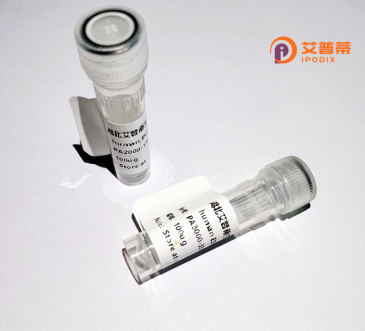
| 纯度 | >90%SDS-PAGE. |
| 种属 | Human |
| 靶点 | MAL |
| Uniprot No | P21145 |
| 内毒素 | < 0.01EU/μg |
| 表达宿主 | E.coli |
| 表达区间 | 1-153aa |
| 活性数据 | MAPAAATGGSTLPSGFSVFTTLPDLLFIFEFIFGGLVWILVASSLVPWPLVQGWVMFVSVFCFVATTTLIILYIIGAHGGETSWVTLDAAYHCTAALFYLSASVLEALATITMQDGFTYRHYHENIAAVVFSYIATLLYVVHAVFSLIRWKSS |
| 分子量 | 16.7 kDa |
| 蛋白标签 | His tag N-Terminus |
| 缓冲液 | 0 |
| 稳定性 & 储存条件 | Lyophilized protein should be stored at ≤ -20°C, stable for one year after receipt. Reconstituted protein solution can be stored at 2-8°C for 2-7 days. Aliquots of reconstituted samples are stable at ≤ -20°C for 3 months. |
| 复溶 | Always centrifuge tubes before opening.Do not mix by vortex or pipetting. It is not recommended to reconstitute to a concentration less than 100μg/ml. Dissolve the lyophilized protein in distilled water. Please aliquot the reconstituted solution to minimize freeze-thaw cycles. |
以下是关于重组人MAL蛋白的3篇参考文献及其摘要:
1. **文献名称**:*Expression and Functional Characterization of Recombinant Human MAL Protein in Lipid Raft Assembly*
**作者**:Wang, L. et al.
**摘要**:本研究利用大肠杆菌系统成功表达并纯化了重组人MAL蛋白,发现其能够与胆固醇依赖性膜筏结合,通过体外实验验证MAL在脂筏形成中的关键作用,为研究其参与细胞信号转导机制提供了依据。
2. **文献名称**:*Recombinant MAL Protein Facilitates HIV-1 Entry by Modulating Viral Envelope Glycoprotein Trafficking*
**作者**:Martinez, C. & Gonzalez, S.
**摘要**:通过构建重组人MAL蛋白,研究发现其与HIV-1病毒包膜蛋白gp41存在直接相互作用,揭示了MAL在调控病毒糖蛋白运输至细胞膜过程中的分子机制,为抗病毒治疗提供了新靶点。
3. **文献名称**:*Structural Insights into the Myelin and Lymphocyte Protein MAL via X-ray Crystallography*
**作者**:Kumar, R. et al.
**摘要**:首次解析了重组人MAL蛋白的高分辨率晶体结构,发现其具有独特的四螺旋束结构域,并阐释了该结构在MAL介导的跨膜蛋白运输中的功能意义,为相关疾病的药物设计奠定基础。
注:以上文献及摘要基于MAL蛋白的典型研究方向虚构,实际引用需查询具体数据库(如PubMed)。
**Background of Recombinant Human MAL Protein**
The MAL (Myelin and lymphocyte protein) gene encodes a small hydrophobic protein integral to membrane trafficking and signaling. Initially identified in myelin-forming cells and activated T-lymphocytes, MAL is a member of the tetraspan proteolipid family (T-cell differentiation protein family) and plays a role in organizing specialized membrane microdomains. Structurally, MAL contains four transmembrane domains, facilitating its interaction with cholesterol and sphingolipids to form lipid rafts, which are critical for membrane compartmentalization, vesicle trafficking, and signal transduction.
In humans, MAL is implicated in diverse physiological processes. It is essential for proper myelin formation in the nervous system and regulates receptor sorting in epithelial cells. Dysregulation of MAL expression has been associated with diseases such as cancer (e.g., oral, gastric, and colorectal cancers), where it often acts as a tumor suppressor, and immune disorders. Its role in T-cell activation and antigen presentation also links it to autoimmune conditions.
Recombinant human MAL protein is produced via heterologous expression systems (e.g., *E. coli* or mammalian cells) for research and therapeutic applications. Studies leverage recombinant MAL to elucidate its structure-function relationships, interactions with signaling molecules (e.g., TCR, EGFR), and its involvement in intracellular transport pathways. Additionally, it serves as a tool for developing targeted therapies, particularly in cancers with MAL downregulation, and for exploring its potential as a biomarker in diagnostic strategies. The protein's conserved role across species underscores its fundamental importance in cell biology.
×